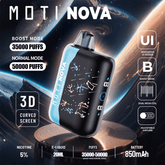Is Nicotine a Nootropic?
Even though it's frequently connected to addiction and smoking, nicotine has a lot of positive effects when used correctly and carefully. It is an effective medicine that has the potential to be a biohack when utilized in its purest form. It can be a powerful biohack in little dosages, and its usage for improving cognition and performance may become more widespread.
Is Nicotine a Nootropic?
Yes nicotine is a nootropic and has some short term positive effects on the brain. Proper dosage of nicotine can help with focus, coordination, short term memory and more.
Everything depends on the way you use it. You gain advantages and reduce danger by using a mouth spray or lozenge. It's a little riskier to apply a patch. It's a tragedy to smoke.
If you do choose to try nicotine, be cautious with it. Taking it on an as-needed basis would be a wise move. Use it if you want to remain very sharp for a lengthy presentation or meeting. Otherwise, avoid taking it frequently.
Is Nicotine Considered a Cognitive Enhancer?
Even among non-smokers, nicotine has a significant impact on cognitive function. Some nootropics users assert that they can occasionally use nicotine for a mental boost, even though developing a nicotine addiction could negatively affect cognition (and general health).
Clinical evidence supports this. The nicotinic acetylcholine receptor (nAChR) is essential for cognitive function.

What Does Nicotine Help With?
Nicotine for Focus
By increasing the focus-enhancing brain chemical acetylcholine, nicotine in cigarettes improves memory and learning. The brain receives the building blocks it needs to produce new brain cells and brain neurotransmitters, as well as the fuel it needs for mental energy. It also helps people be more resilient to stress.
According to studies, nicotine can improve working memory, focus and attention, and reaction time. Nicotine increases motivation and mental clarity. There are fewer mood changes and less anxiety. Nicotine is a nootropic that dramatically improves attention and concentration.
Coordination
Nicotine can bind to various nicotinic receptor types, and each receptor has a distinct impact on your brain. Nicotine improves balance, alertness, memory, and reaction time. The appropriate amount of nicotine has many positive effects on your health, but too much is hazardous. You first have a quicker, more accurate motor function.
Short Term Memory
Nicotine improves short-term memory. When asked to retell a story word for word, those who took nicotine did so more accurately than those who were given a placebo. They also remembered a list of terms they had just read better. Again, chewing gum and patches both improved memory.

Best Ways to Use Nicotine as a Nootropic?
Gum
You don't experience a euphoric rush from nicotine gum because it only delivers 2-4 mg over 20–30 minutes, but you still benefit from nicotine's energy-boosting properties. Although uncommon, nicotine gum addiction is conceivable. Chewing nicotine gum has the drawback of causing your trigeminal nerve to fire more frequently than it should. Your jaw (as well as your neurological system) will be healthier if you chew when you are eating.
Lozenges
The main issue with lozenges is that they include the same harmful chemicals and sweeteners as nicotine gum, including sucralose, acesulfame-potassium (Ace-K), and aspartame. The smallest and aspartame-free Nicorette mini-lozenge is the safest one. You consume minimal dangerous sweeteners, but it is probably insignificant. In the US, it's simple to locate these. Smaller Nicorette lozenges are preferable because the larger ones contain undesirable substances.
Vapes
Vapes are another great source to get nicotine into your bloodstream quick. You can also control the amount of nicotine in your system because you choose when to use it and how much to use. You have more control over nicotine a vape over a cigarette.
Spray
It is a very new development, and each spray contains one milligram. Sucralose is present in each spray in vanishingly minute levels that are presumably insufficient to affect the gut microbiome. This is a great alternative when you need a prolonged energy boost because you can rapidly feel it after spraying it under your tongue.
Patches
Patches fall halfway between a gum and a cigarette: they have a higher nicotine content than gum. However, you take in more concentration and energy-giving nicotine over the day as your skin slowly absorbs it. Even though it doesn't feel very satisfying, your energy is higher and steadier.

Nicotine Recommended Dosage
- Nicotine is dosed as a nootropic at 1 to 2 mg as needed. Usually, nicotine gum contains 2 to 4 mg. Cut a dose of 2 mg from a 4 mg piece of gum in half. Over 20 to 30 minutes, gum releases the nicotine dose.
- Aspartame and other harmful sweeteners are the issue with nicotine gum.
- Compared to gum or lozenges, nicotine patches often have a higher nicotine content and are available in various strengths. Contrary to product instructions, neuro hackers trim the patch to the desired dose.
- The best lozenges are mini-sized because they contain fewer hazardous ingredients than larger lozenges. Within 10 to 20 minutes, the 2 mg mini lozenge split in half offers cognitive benefits.
Be careful on how much nicotine you ingest. Taking in too much nicotine can cause you to get headaches, stomach pain and even dizziness.
FAQ?
Does Nicotine Kill Brain Cells?
The hippocampus, a part of the brain essential to memory, can lose brain cells and prevent new ones from growing. This discovery may help explain the cognitive difficulties many heavy smokers face when quitting. Nicotine affects many neurotransmitters in the brain.
Additionally, nicotine has been proven to destroy brain cells and halt the growth of new brain cells. It's unknown exactly how nicotine destroys brain cells. However, studies on fetal exposure have found that nicotine can cause apoptosis, which is immature cells' form of programmed cell death.

How Does Nicotine Feel?
Your brain receives nicotine fast. Once there, it leaves you with a variety of emotions. Its ability to alter mood is among its most prevalent effects. Most individuals are curious about how a nicotine rush feels. Many people report this as having a subtle, powerful, and complicated influence that helps them focus and stay alert. Additionally, many people may relate to how it helps them feel at ease. They appear to be at peace.
Can I Get Addicted to Nicotine If I've Never Smoked?
Yes, nicotine addiction is possible even if you have never smoked. When you crave nicotine, you become dependent and find it difficult to cut back. Nicotine causes your brain to feel good, but these feelings are temporary. As a result, you light another cigarette. You need more nicotine to feel good the more you smoke. You go through uncomfortable mental and bodily changes when you try to stop. These are signs of quitting nicotine.














